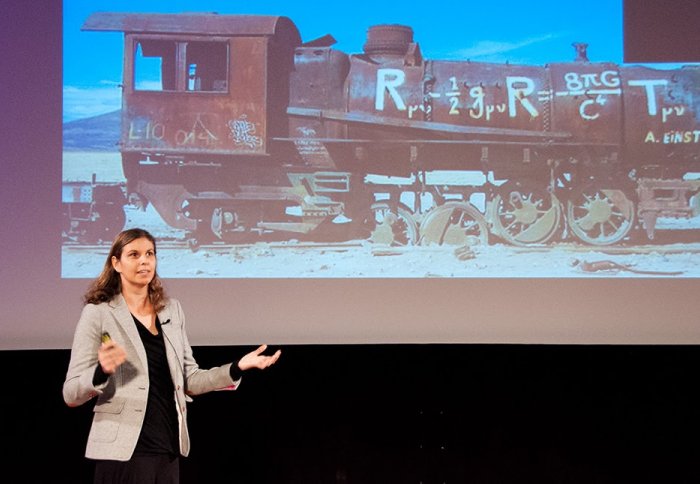Expanding horizons: throwing new light on dark energy
by Dan Warren

Dr Claudia de Rham
Dr Claudia de Rham explains how winning the Royal Society Wolfson Research Merit Award will help her throw new light on dark energy.
“This award has facilitated me coming back to the UK and made it easier for me to set up a group and collaborate more widely.”
– Claudia de Rham
Reader in Theoretical Physics
Dr de Rham has already been recognised with such an impressive collection of fellowships and prizes that it seemed pertinent to open with this particular question:
Does winning awards ever stop feeling special?
No! Every single time you apply you try your best, but you still think ‘I’m never going to get it’. Plus it requires a lot of work; the process is different for each application and it can take months. So if you win one, it is really something – it makes you very happy.
Why did you want to come to the UK - and to Imperial in particular?
There are such strong facilities here and lots of groups, which allows for plenty of collaboration. The groups at Imperial are extremely stimulating. The staff have such expertise in theoretical physics and cosmology and it’s inspiring to see how much they interact.
Can you summarise the main focus of your work?
I’m a cosmologist so I’m interested in understanding the universe as a whole; why and how it was created, the stages of development, what it is made of and where it will evolve to be in the future - which is all inter-related.
Observations give us some idea. For example, we can see that the universe is expanding and that this expansion is accelerating, but that’s counter intuitive as gravity normally pulls things towards each other.
“It’s important for cosmologists ... to communicate what excites us back to the public. It’s a luxury to do high level research and the public deserves to be inspired by it.”
Claudia de Rham
To explain this, we say the universe is filled with dark energy, which is really just a placeholder for ‘the unknown’. My work is involved with what this is, or rather what it could be.
What does a typical work day look like?
During the day, there is lots of interaction and collaboration - talking with colleagues and attending seminars.
In the evening, I still like to do my own calculations, usually with pen and paper and sometimes on the computer. I often do this at home so that the day can be spent in discussion, sharing ideas.
When did you first become interested in cosmology?
What appealed to me from a very young age was to study the sky and look at stars; to be an astronomer.
I went to school for a time in Madagascar where the skies were amazing. But progressively, my interests related more and more to cosmology and I also found I had an aptitude for the theoretical.
Who inspires you – and what do you do to inspire others?
Stephen Hawking is an amazing inspiration. He’s a role model for me and so many others.
However, I do think it’s important for cosmologists to try and inspire other people; to communicate what excites us back to the public. It’s a luxury to do high level research and the public deserves to be inspired by it. We also want to motivate the next generation of researchers.
You have travelled a lot in the course of your career; does that have its advantages?
Travelling is the nature of academia, especially in the field of theoretical and high energy physics - and I’ve always been happy to do exchange years, even as an undergraduate.
Travel gives you a lot of experience. Even if you’re very good at what you do, adapting to another group and seeing how different people think can really extend your horizons.
Finally, Dr de Rham gave her view on whether she thinks there will ever be one universal theory of everything:
“I doubt very much there will be an end to how much we can learn. The way history has gone is that the more we learn and discover, the more we realise how little we actually know and how much more elegant and deep nature is.”
As long as the questions keep coming, bright people the Department of Physics will strive to answer them. For now, the Department is delighted to strengthen their team with such a rising star.
Article text (excluding photos or graphics) © Imperial College London.
Photos and graphics subject to third party copyright used with permission or © Imperial College London.
Reporter
Dan Warren
Advancement